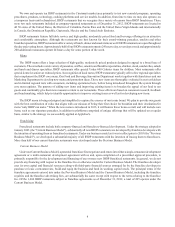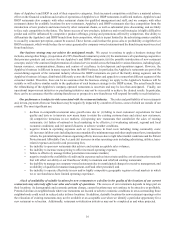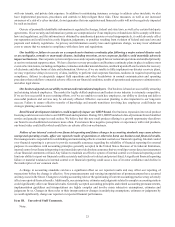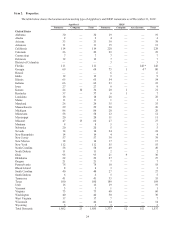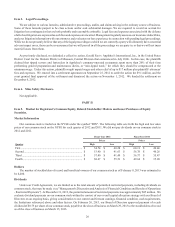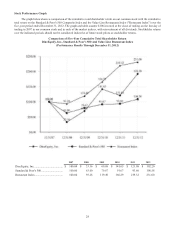IHOP 2012 Annual Report Download - page 36
Download and view the complete annual report
Please find page 36 of the 2012 IHOP annual report below. You can navigate through the pages in the report by either clicking on the pages listed below, or by using the keyword search tool below to find specific information within the annual report.18
restaurant rests with the franchisee. If the franchisee does not successfully operate its restaurants in a manner consistent with our
standards, or customers have negative experiences due to issues with food quality or operational execution, our brand values could
suffer, which could have an adverse effect on our business.
There also is no assurance that international operations will be profitable or that international growth will continue. Our
international operations are subject to all of the same risks associated with our domestic operations, as well as a number of additional
risks. These include, among other things, international economic and political conditions, foreign currency fluctuations, and
differing cultures and consumer preferences.
We also are subject to governmental regulations throughout the world that impact the way we do business with our international
franchisees and vendors. These include antitrust and tax requirements, anti-boycott regulations, import/export/customs regulations
and other international trade regulations, the USA Patriot Act and the Foreign Corrupt Practices Act. Failure to comply with any
such legal requirements could subject us to monetary liabilities and other sanctions, which could harm our business, results of
operations and financial condition.
Factors outside our control may harm our brands' reputations. The success of our restaurant business is largely dependent
upon brand recognition and the strength of our franchise systems. The continued success of our company-operated restaurants
and our franchisees will be directly dependent upon the maintenance of a favorable public view of the Applebee's and IHOP brands.
Negative publicity (e.g., crime, scandal, litigation, on-site accidents and injuries or other harm to customers) at a single Applebee's
or IHOP location can have a substantial negative impact on the operations of all restaurants within the Applebee's or IHOP system.
Multi-unit food service businesses such as ours can be materially and adversely affected by widespread negative publicity of any
type, but particularly regarding food quality, food-borne illness, food tampering, obesity, injury or other health concerns with
respect to certain foods, whether or not accurate or valid. The risk of food-borne illness or food tampering cannot be completely
eliminated. Any outbreak of food-borne illness or other food-related incidents attributed to Applebee's or IHOP restaurants or
within the food service industry or any widespread negative publicity regarding the Applebee's or IHOP brands or the restaurant
industry in general could harm our reputation. Although the Company maintains liability insurance, and each franchisee is required
to maintain liability insurance pursuant to its franchise agreements, a liability claim could injure the reputation of all Applebee's
or IHOP restaurants, whether or not it is ultimately successful.
We may be subject to legal proceedings that could be time consuming, result in costly litigation, require significant amounts
of management time and result in the diversion of significant operational resources. We are involved in lawsuits, claims and
proceedings incident to the ordinary course of our business. Litigation is inherently unpredictable. Any claims against us, whether
meritorious or not, could be time consuming, result in costly litigation, require significant amounts of management time and result
in the diversion of significant operational resources. There have been a growing number of lawsuits in recent years. There has
also been a rise in employment-related lawsuits. From time to time, we have been subject to these types of lawsuits. The cost of
defending claims against us or the ultimate resolution of such claims may harm our business and operating results. In addition,
the increasingly regulated business environment may result in a greater number of enforcement actions and private litigation. This
could subject us to increased exposure to stockholder lawsuits.
We and our franchisees are subject to a variety of litigation. We and our franchisees are subject to complaints or litigation
from guests alleging illness, injury or other food quality, food safety, health or operational concerns. We and our franchisees are
also subject to "dram shop" laws in some states pursuant to which we and our franchisees may be subject to liability in connection
with personal injuries or property damages incurred in connection with wrongfully serving alcoholic beverages to an intoxicated
person. We may also initiate legal proceedings against franchisees for breach of the terms of their franchise agreements, including
underreporting of sales , failure to operate restaurants according to standard operating procedures and payment defaults. Such
claims may reduce the profits generated by company-operated restaurants and the ability of franchisees to make payments to us.
These claims may also reduce the ability of franchisees to enter into new franchise agreements with us. Although our franchise
agreements require our franchisees to defend and indemnify us, we may be named as a defendant and sustain liability in legal
proceedings against franchisees under the doctrines of vicarious liability, agency, negligence or otherwise.
Third-party claims with respect to intellectual property assets, if decided against us, may result in competing uses or require
adoption of new, non-infringing intellectual property, which may in turn adversely affect sales and revenues. We regard our
service marks and trademarks related to our restaurant businesses as having significant value and being important to our marketing
efforts. To protect our restaurants and services from infringement, we rely on contracts, copyrights, patents, trademarks, service
marks and other common law rights, such as trade secret and unfair competition laws. We have registered certain trademarks and
service marks in the United States and foreign jurisdictions; however, effective intellectual property protection may not be available
in every country in which we have or intend to open or franchise a restaurant. Although we believe we have taken appropriate
measures to protect our intellectual property, there can be no assurance that these protections will be adequate.


